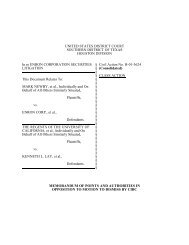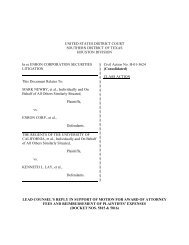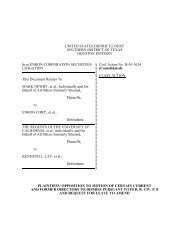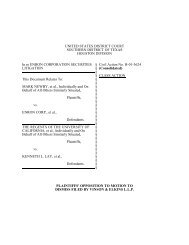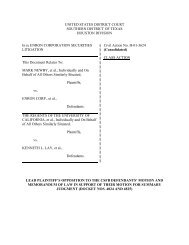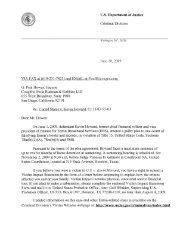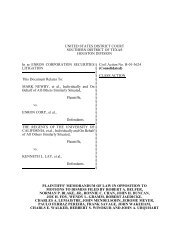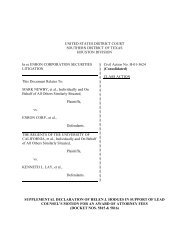Declaration Of Helen J. Hodges In Support Of Lead Counsel's ...
Declaration Of Helen J. Hodges In Support Of Lead Counsel's ...
Declaration Of Helen J. Hodges In Support Of Lead Counsel's ...
Create successful ePaper yourself
Turn your PDF publications into a flip-book with our unique Google optimized e-Paper software.
dated June 5, 2006 as It Pertains to Affiliated Ute (Docket No. 4898). The Response argued that<br />
<strong>Lead</strong> Plaintiff had standing to pursue claims concerning the Foreign Debt Securities, and that <strong>Lead</strong><br />
Plaintiff were entitled to the presumption of reliance under Affiliated Ute. As mentioned above, the<br />
Court denied <strong>Lead</strong> Plaintiff’s motion for reconsideration. With regard to the financial institutions<br />
defendants’ submission, the Court denied the cross-motion, preserving its ruling on the application<br />
of Affiliated Ute for a presumption of reliance on claims under Rule 10b-5(a) and (c). See 2/8/07<br />
Opinion and Order re Motion for Reconsideration (Docket No. 5391) at 44-45.<br />
270. On July 17, 2006 and July 18, 2006, defendants Credit Suisse, V&E, Barclays and<br />
Merrill Lynch filed petitions in the Fifth Circuit Court of Appeals seeking interlocutory review under<br />
Rule 23(f) of the Court’s order granting class certification. <strong>In</strong> the petitions, Credit Suisse argued that<br />
an appeal was warranted because it would resolve the controlling and unsettled question of a<br />
secondary actor’s primary liability, provide guidance on the issue of joint and several liability and<br />
the Court erred in applying the Affiliated Ute presumption of reliance; V&E argued for appeal<br />
because the Court’s application of the fraud-on-the-market presumption of reliance rested on a<br />
flawed theory of liability, later review was threatened by the amount of damages claimed, and <strong>Lead</strong><br />
Plaintiff lacked standing to sue the defendant for Enron’s statements; Barclays argued for appeal<br />
because the Court’s class certification decision was based on an incorrect interpretation of Central<br />
Bank and the PSLRA, the Court erroneously held that two presumptions of reliance were applicable,<br />
and the Court misinterpreted the scope of joint-and-several liability; Merrill Lynch argued for appeal<br />
to review the Court’s ruling on the question of primary liability, because the Affiliated Ute<br />
presumption did not apply, the requirements of Greenberg were not met, and addressing the<br />
application of joint-and-several liability would resolve a novel question of law fundamental to class<br />
certification. On July 28, 2006, <strong>Lead</strong> Counsel filed Plaintiffs’ Combined Answer in Opposition to<br />
Credit Suisse’s, Merrill Lynch’s, Vinson & Elkins’ Petitions for Permission to Appeal (Fed. R. Civ.<br />
- 149 -



